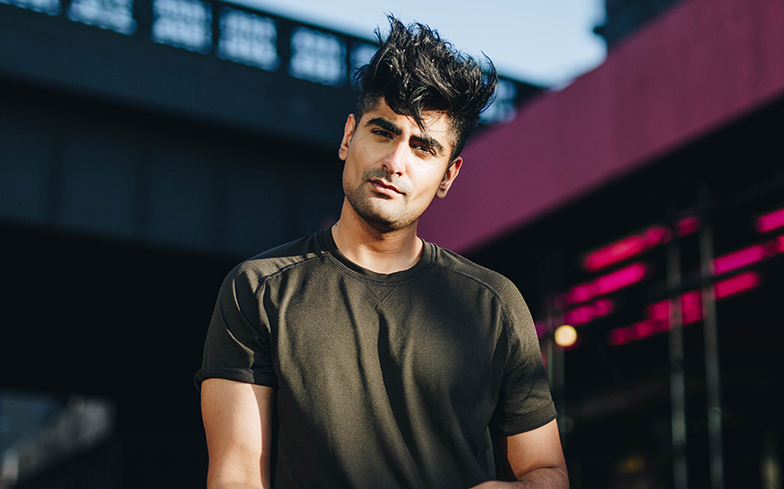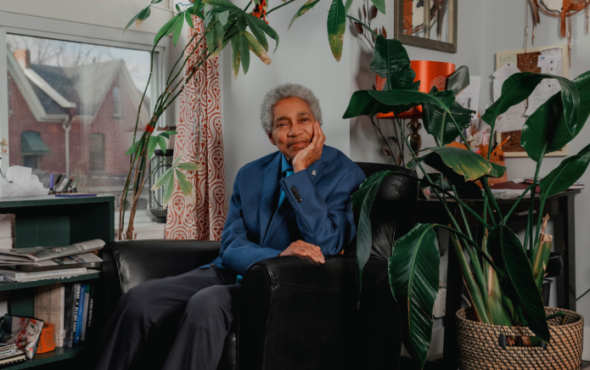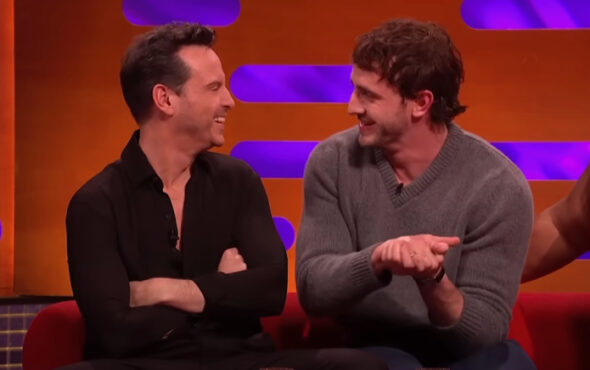
“Heteronormative societal rules are so engrained in Indian culture that it’s very difficult to undo that work. But with Section 377B overruled, I do think that we’re starting to make a change.”
Vardaan Arora is ready to conquer the music industry as an out-and-proud person of colour. The Indian-born performer, who became a viral sensation after the release of Feel Good Song in 2016, is determined to represent the “vibrant, diverse community of LGBTQ artists” by showing the industry that POC can slay just as fucking hard.
“Troye Sivan’s album did amazingly, the Years and Years record was also a commercial success,” he told us. “They’re cis, white gay men, and all credit to them because they’re amazing, but I just don’t think everyone’s getting the attention they deserve.”
Growing up in India, Vardaan didn’t have many LGBTQ role models. However, like us all, he was gagged by pop princesses such as Hilary Duff, Britney Spears and Avril Lavigne, which helped shape his identity as a pop performer. “I used to dream of seeing them in concert. I had that kind of a childhood, and it feels surreal to me that I’m now able to do what those people were doing for me back then.”
Today, Vardaan released his sixth single, Dance Like You, a dark dancefloor anthem which explores the feelings of jealousy and wanting what others have. I’m sure we can all relate huh? In celebration, we spoke to the up-and-coming artist and discussed his musical influences and what it was like to grow up gay in his home country.
I’ll start off easy: how did you get into music?
Ever since I was a young child, I enjoyed singing. I started recording covers on YouTube back in 2014, and it wasn’t until 2016 that I felt like I wanted to write my own music. I wrote my first single, Feel Good Song, back in the summer of 2016 and I flew to Nashville to work with a producer I met in LA. I got into the studio, wrote the song in a day, and cut vocals for it. It was so new to me, but I fell in love with the process of songwriting and being able to express myself in a way I didn’t know was possible. I released Feel Good Song and it went viral on Spotify, and the response felt so rewarding.
Two million streams… Like c’mon.
Yeah! When you’re putting something out for the first time, you have no idea what to expect. I was like, ‘This is either gonna be really good or really bad.’ Luckily for me, I got a good response and I just kept doing it because when I’m in the studio, I’m 100% me in ways that I can’t be in real life.
You’ve got a new song out called Dance Like You. What’s the story behind it?
What I’ve done with a lot of my music is explore darker themes, but contrast that with upbeat tropical, club-ready beats. I want my music to make people feel good, and to get up and dance, but if you listen to the lyrics, they’re definitely darker. Dance Like You actually explores feelings of jealousy, and it’s about looking at other people and wanting what they have. How do you feel that the grass is always greener on the other side? It confronts that emotion about being completely natural, like, it’s natural to feel jealous, and the grass is always greener. It’s wanting something that somebody else has, and how a lot of times people deny that they’re feeling that way.
Growing up in India, did you have any influences that inspired you musically?
It would surprise you. Music in India is mostly Bollywood, but I was a little different. I’ve always been a little different from other kids in school and other people that I knew. I paid a lot of attention to pop music, whether it was American pop music or British pop music. Much like many other gay boys, I grew up listening to Britney Spears, Hilary Duff, Avril Lavigne, all of the pop queens we grew up loving. I always felt far removed from that world, just because I was in India, which is so far away from where those pop stars are. I used to dream of seeing them in concert, and I would lip sync to Shakira in my bedroom [laughs]. I had that kind of a childhood, and it feels surreal to me that I’m now able to do what those people were doing for me back then. It still hasn’t hit me, and I’m not saying that I’m on the level of being a pop star, but I just feel so lucky that I’m able to do what I dreamed of. But to answer your question, I didn’t have a lot of Indian influences, but it’s a huge part of my identity. I feel like subconsciously, I’m influenced by how I grew up even if I’m not trying to actively put it into my music.
I love that you bring up Hilary and Avril, because they’re two pop kweens people don’t mention much these days.
Hilary Duff was a huge part of my… Like, if you had gone into my room when I was in middle school, the entire wall was covered with Hilary. I used to run a fan website for her. I met her a few times since, and I still can’t believe that I have! She’s just one of my all time favourites. If you had the time, I could talk about her for hours.
You had a lot of straight icons that gays love, but did you have any LGBTQ icons?
Growing up, I didn’t really have a lot of LGBTQ pop stars to look up to. In the 90s, I couldn’t think of anyone who was out-and-proud, and making pop music, which is why I think the resurgence of gay pop stars is so important. We have the MNEK’s of the world, the Sam Smith’s, the Troye Sivan’s… I just feel like there’s so many out-and-proud artists and I’m one of them. I didn’t have that growing up, and I do think that’s why a lot of gay people my age relate to a lot of female pop stars. All the pop stars I stanned growing up were female. I think we want to have what they have, the ability to showcase their femininity and be proud of it, and I think we live vicariously through the lives of our Lady Gaga’s, our Madonna’s, our Britney’s. I think that’s why it’s so important for a lot of gay people to have people they can see themselves in. I can name so many out-and-proud gay pop stars who are killing right now. I do think though that we do need more LGBTQ artists of colour. I think there is a lack who are representing the LGBTQ community, especially in pop music. But I do think it’s changing, and I wanna fight to change that as much as I can.
And MNEK for example, one of the few femme LGBTQ artists of colour, didn’t find commercial success with his album even though it was fucking fantastic. Why do you think that is?
Exactly. And a lot of times, people in the industry will be like, ‘Oh Kim Petras’ last EP did really well, so we can have trans pop stars,’ or ‘MNEK’s album didn’t do well, so we can’t have gay pop stars of colour.’ I think a lot of times, one person is given a lot of responsibility and a lot of pressure is put on them. But I agree with you, MNEK’s album was so good, there’s so many hits, but I don’t know if the label did the best job of promoting him. I don’t know what happened there because it is a good album, so it breaks my heart that it didn’t do well commercially, because he is a huge inspiration for people like me. I don’t think this is gonna stop him from continuing to kill it.
The industry has only just started accepting white gay artists, but when it comes to femme gay artists of colour…
It really slows down the pace at which we should be going right now. Troye Sivan’s album did amazingly, the Years and Years record was also a commercial success. They’re cis, white gay men, and all credit to them because they’re amazing, but I just feel like there’s such a vibrant, diverse community of LGBTQ artists out there in the world, and I just don’t think everyone’s getting the attention they deserve.
I’m gonna go a bit deep now: what was it like growing up gay in India?
I actually had girlfriends all throughout high school, and then I didn’t come out until I was 20 in college. Growing up in India, to put it into a way that isn’t super long, was hard. You associate the word ‘gay’ with everything negative. It is used as an insult. I feel sorry about how late it was in my life that I recognised that being gay wasn’t a negative thing. Everyone knew I was gay before I came out, and in an interview with Billboard, I actually said, “Everyone knowing that you’re gay before you have a chance to come out is like being the punchline of a joke that everyone except you is in on.” That’s what happened to me and it really made life difficult because it was like everyone else was on the same page, and I was in a different universe altogether. But it all clicked when I did come out, and now I use something that I used to be embarrassed of and something that I used to hide, as something that I’m proud of. I was able to take something I saw as a weakness and turn it into a strength.
Growing up India, you must’ve been conditioned to think that way.
Yeah, and I learned so many things when I moved to New York, and I was lucky to be able to move to New York and away from India. A lot of people don’t have that privilege. A lot of things are changing now, and it’s helpful to see more people coming out. There’s hardly any LGBTQ representation in Bollywood or in India in general. They just recently legalised gay sex a couple weeks ago, and that was a huge moment, and I’m glad things are changing for the better.
In the past, India have decriminalised gay sex, but rulings were overturned. Do you think it will stick this time?
I think so. I think the media attention it got was huge. I think it did help a lot of people to come out, and I want to show people that you can come out and live a happy life and do what you love, and pursue your dreams. I never thought it would be possible, even for me. I wanna do whatever I can to help the movement, but I don’t think it will be overruled again just because we’ve come too far.
Where do you see the LGBTQ community in India going in the next few months?
I think that, especially because of the media attention it got, and the way big brands changed their logos to rainbows etc, I’d never seen that happen in India. I think that it’s gonna help people come out of the closet, and it’s gonna help allies to be more sympathetic and compassionate towards the LGBTQ community. Those high school bullies that used to call kids ‘fag’ and used to make fun of them for being gay and feminine, will start thinking twice. And what’s great is that the younger generation of parents will also raise their kids to be more compassionate and do better, so I think everyone’s eyes are opening to how it’s not okay to treat people differently because of their sexuality or what gender they identify as.
Even though it’s been overruled, what do you think are the challenges LGBTQ people still face in the country?
It’s the small things you wouldn’t even think about, like holding hands in public, kissing in public, or even meeting someone for the first time and they ask if you have a girlfriend. Heteronormative societal rules are so engrained in Indian culture that it’s very difficult to undo that work. But with Section 377B overruled, I do think that we’re starting to make a change. I feel like I’m repeating myself over and over! But it’s not just about sex, it’s symbolic for the entire LGBTQ movement. Things are still hard, and it’s not an overnight thing where I can go out and get married to my boyfriend and invite my entire family to my wedding. I would like to see more teenagers be out-and-proud in school. There was not one out-and-proud gay boy in my high school, and it would’ve been nice to see that especially when I was younger.
Has growing up in India as a gay man influenced you as an artist?
Yeah, totally. Going back to being obsessed with Hilary Duff and Britney Spears, I think a lot of gay men no matter where they’re from in the world, have some universal shared experiences. You’ve seen all the ‘gay culture is…’ tweets I’m sure? It’s like, no matter where you’re from in the world, what your childhood was, there’s so many things you can find in common with gay men. For me, the internet was huge in me coming to terms with my own sexuality, and having friends online that I could confide in just because I didn’t fit in anywhere else. Growing up in India, I feel lucky that I was exposed to two different languages, two different cultures, so I sometimes feel like I have this split personality of a double life where in India, I’m a completely different person, and in America, I’m a completely different person. They’re both different sides of my personality, and I try to bring that into my music as much as possible, and I try to draw from my own struggles with mental health, and to be as honest as I can be.
Vardaan Arora’s fantastic new single, Dance Like You, is now available on iTunes and streaming services. Listen below.






